After your hypertrophy workout, focus on consuming a balanced mix of macronutrients to support muscle growth and recovery. Aim for fast-digesting protein sources like whey or lean meats, along with quick-absorbing carbohydrates to replenish glycogen stores. Don't forget healthy fats to aid in nutrient absorption and reduce inflammation. Timing is essential: try to eat within 30 minutes post-exercise for best results. Hydrate well and consider electrolyte replacement, especially after intense sessions. Adjust your intake based on your individual goals and workout intensity. Tailor your post-workout nutrition plan to maximize your training adaptations and long-term fitness progress. The following guide will help you fine-tune your approach for best gains.
Core Insight
- Consume a combination of fast-digesting carbohydrates and high-quality protein within 30 minutes post-workout for optimal recovery.
- Aim for 0.25-0.4g of protein per kg of body weight and 0.8-1.2g of carbohydrates per kg immediately after training.
- Include a source of healthy fats in your post-workout meal to support muscle growth and reduce inflammation.
- Drink water or an electrolyte-rich beverage to replace fluids lost during exercise, aiming for 16-24 ounces per pound lost.
- Adjust nutrient intake based on individual goals, training intensity, and body composition for personalized results.
The Science of Post-Workout Nutrition
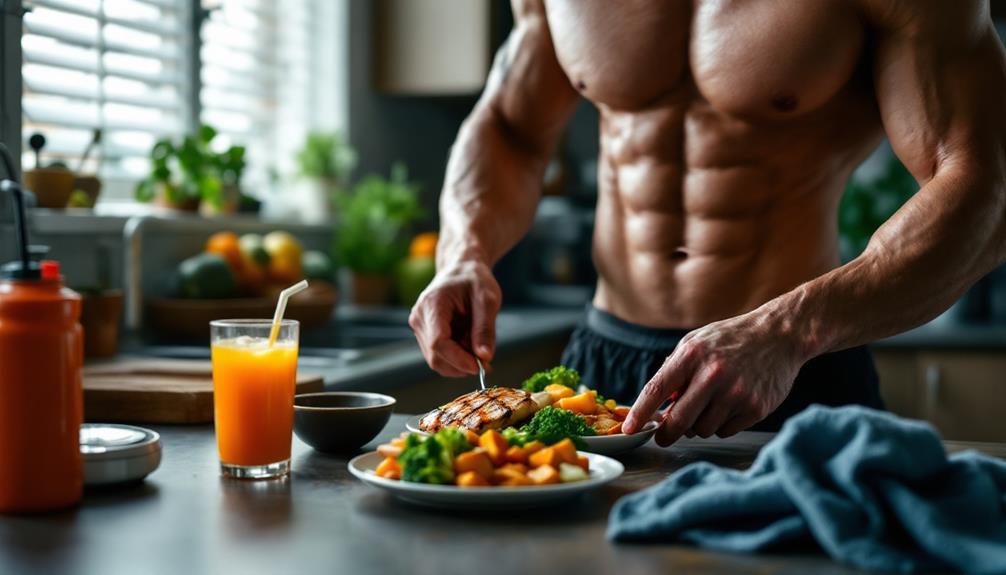
After a tough workout focused on building muscle, your body starts to recover and adapt. During this time, your muscles are ready to take in nutrients, and your metabolism is working hard. Post-workout nutrition centers on two main goals: restoring energy and helping your muscles grow.
Eating fast-digesting carbohydrates is important for quickly replenishing your energy and helping you recover. These carbs are easy to digest and quickly restore your glycogen stores, which get used up during exercise.
Your glycogen stores need to be refilled after exercising. Consuming carbohydrates helps with this and also triggers insulin, which helps your body take in nutrients more effectively. Protein is also crucial for repairing and building muscle, as it provides the amino acids needed for recovery.
When you eat after your workout is important too. Research shows that eating within 30 minutes to 2 hours after exercising can give you the best results. This time frame, known as the "anabolic window," is when your body is most ready to use nutrients for recovery and muscle growth.
Macronutrient Balance for Muscle Growth
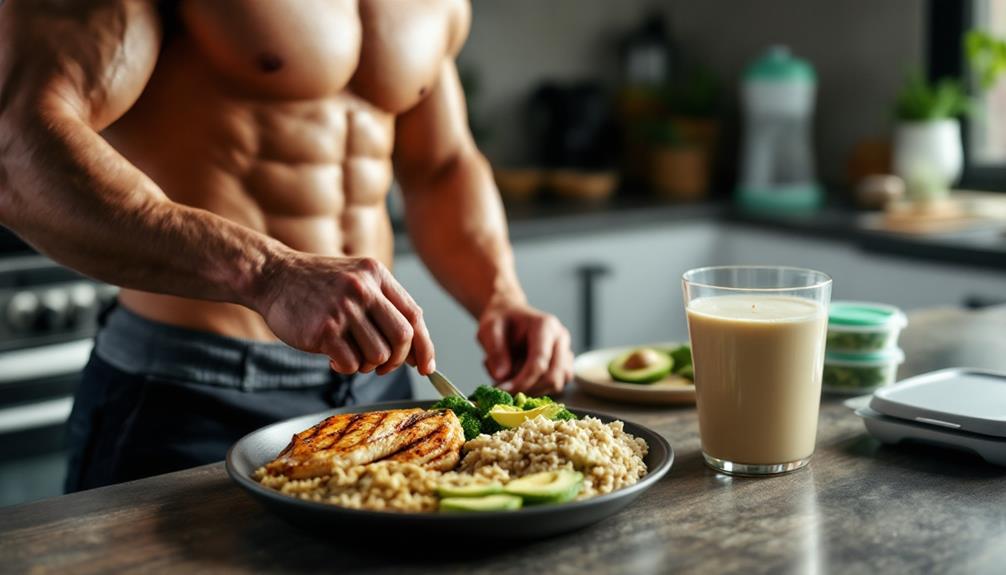
For muscle growth, it's important to balance your macronutrients. After a workout, focus on getting protein, carbohydrates, and healthy fats. Aim for 0.25-0.4 grams of protein per kilogram of your body weight to help build muscle. Include 0.8-1.2 grams of carbohydrates per kilogram to refill your energy stores and aid recovery. Whey protein powders are a great choice for post-workout nutrition, providing about 24-25g of high-quality protein per serving. They also often contain essential BCAAs, which can support muscle recovery and help reduce bloating.
Don't overlook fats, as they are crucial for hormone production. Try to include 0.2-0.3 grams of healthy fats per kilogram in your post-workout meal. Remember, these suggestions are general and may need to be adjusted based on your personal needs and goals.
To put this into practice, create a post-workout meal or shake that includes a lean protein source, complex carbohydrates, and a small amount of healthy fats. This balanced approach will help you maximize muscle growth and recovery.
Protein: Your Muscle-Building Foundation
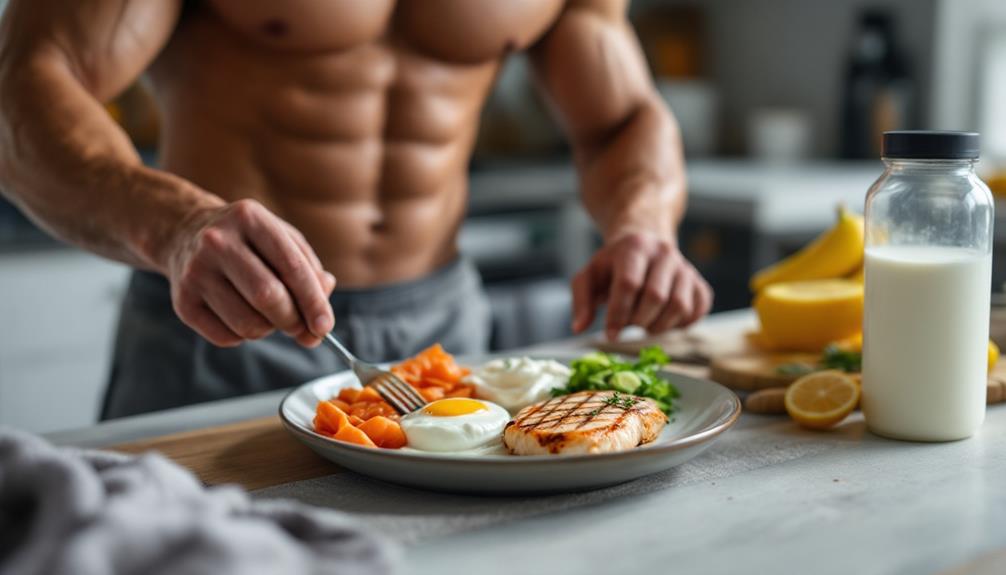
Protein is essential for building and repairing muscles after your workouts. It's important to eat high-quality protein sources within 30 minutes to 2 hours after exercising. Aim for 0.25 to 0.3 grams of protein for every kilogram of your body weight during this meal. For the best results, consider adding grass-fed whey protein to your post-workout meal, as it has a great amino acid profile and health benefits.
Choose proteins that include all the essential amino acids. Some good options are:
- Lean meats like chicken, turkey, and beef
- Fish such as salmon and tuna
- Eggs
- Dairy products like Greek yogurt and cottage cheese
- Plant-based sources, including tofu, legumes, and quinoa
To help your body absorb protein better, pair it with some carbohydrates. This will help restore your energy levels and improve protein uptake in your muscles. If you're having trouble getting enough protein from food alone, think about using a high-quality protein powder, either whey or plant-based.
Carbohydrates for Recovery and Replenishment

Carbohydrates are crucial for your recovery after a workout. After intense training, your body needs to refill its energy stores and help your muscles heal. Eating carbs helps you:
- Restore your energy
- Boost insulin, which helps your body take in nutrients
- Decrease muscle breakdown
- Speed up recovery
For the best results, think about using post-workout carbohydrate powders. These supplements are made to be absorbed quickly, helping you replenish your energy fast.
Try to eat 0.5 to 0.7 grams of carbs for every pound you weigh within 30 minutes after exercising. Good options for quick energy are fruits, white rice, and sports drinks. Later, include more complex carbs like whole grains and sweet potatoes in your meal for lasting energy.
Healthy Fats: Overlooked but Essential
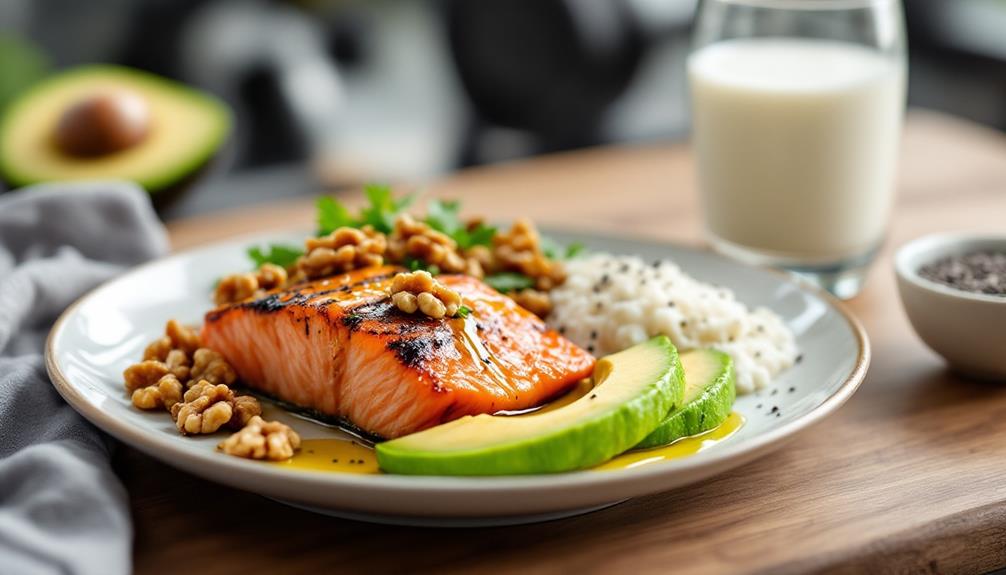
Healthy fats are often ignored in post-exercise meals, but they play a crucial role in recovery and muscle growth. After strength training, it's important to include sources of omega-3 fatty acids and monounsaturated fats in your diet. These fats help reduce inflammation, support hormone production, and improve nutrient absorption. Adding healthy fats to your meals can significantly boost your workout results and overall performance.
A good guideline is to aim for about 0.5 grams of fat for every kilogram of your body weight after exercising. Some great sources of healthy fats are:
- Fatty fish (like salmon and mackerel)
- Avocados
- Nuts and seeds
- Olive oil
- Egg yolks
Don't hesitate to include these healthy fats in your post-workout meal. They will help with recovery and promote better overall health. Just remember to balance them with protein and carbohydrates for the best results.
Timing Your Post-Workout Meal

Timing your post-workout meal is important for recovery. Your body can absorb nutrients best in the first 30-60 minutes after exercising. This time, often called the "anabolic window," is crucial for helping your muscles recover and grow. Including fast-acting carbohydrates in your post-workout meal can quickly refill your energy stores and aid in recovery.
To take advantage of this time, keep these tips in mind:
- Prepare your post-workout meal ahead of time.
- Include both protein and carbohydrates.
- Choose foods that are easy to digest.
- Drink plenty of water or an electrolyte drink to stay hydrated.
Hydration and Electrolyte Replacement
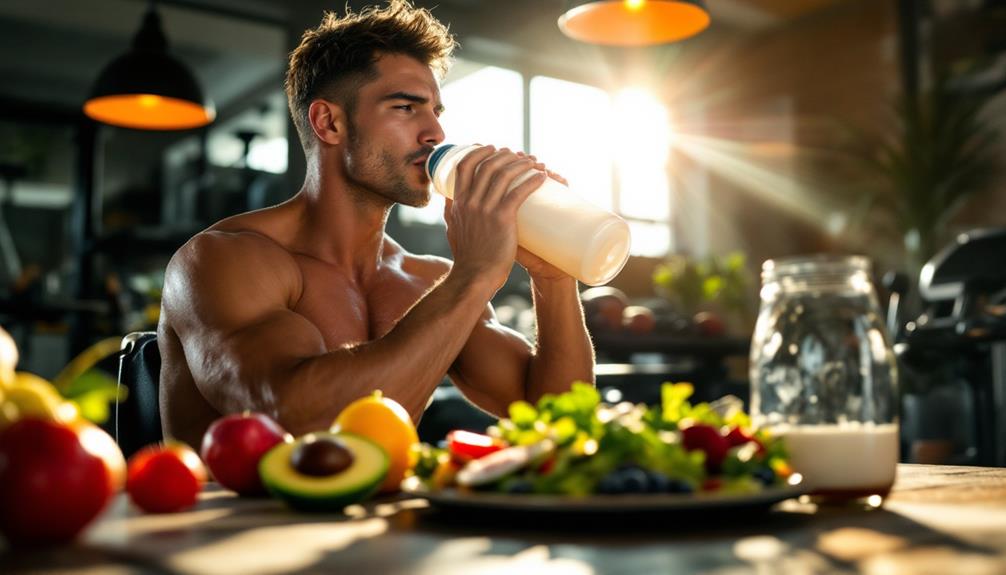
Staying hydrated is important for recovering after your workouts. When you finish an intense training session, you need to replace both the water and electrolytes lost through sweat. A good rule of thumb is to drink 16-24 ounces of fluid for every pound you lost during exercise. Don't just rely on thirst; it might not tell you how much you really need. For the best hydration, think about using electrolyte powders that provide essential minerals without too much sugar.
To help replace electrolytes, you can drink a sports drink or simply add a pinch of salt to your water. Eating potassium-rich foods like bananas or drinking coconut water can also be beneficial. If you sweat a lot or work out in hot weather, you might want to consider a special electrolyte supplement.
Supplements to Enhance Muscle Gains

What supplements can help you build muscle? While whole foods should be the main part of your post-workout nutrition, some supplements may give your gains a boost. Here are a few backed by research:
- Creatine monohydrate: Helps improve strength and increase muscle mass.
- Whey protein: Offers fast-absorbing amino acids for muscle recovery.
- Beta-alanine: Enhances muscle endurance during workouts.
- Branched-chain amino acids (BCAAs): Aid in muscle recovery after exercise.
If you're looking for safe ways to gain muscle without using traditional anabolic steroids, there are natural supplements that can help with muscle protein synthesis and recovery. These can work alongside your diet and training to speed up your progress. But remember, they aren't magic solutions. You still need to work hard in the gym and eat a balanced diet. Supplements should fill in nutrition gaps, not replace healthy foods.
Always talk to a healthcare professional before adding new supplements to your routine, especially if you have any health issues or take medications.
Creating Your Personalized Post-Workout Plan

Now that you understand post-workout nutrition, let's create your personalized plan. First, think about your goals, body composition, and how hard you train. Then, follow these steps:
- Figure out how much of each nutrient you need.
- Choose your protein sources.
- Pick your carbohydrate options.
Use this table to help you:
| Nutrient | Timing | Amount |
|---|---|---|
| Protein | Within 30 min | 0.25-0.3g for every kg of body weight |
| Carbs | Within 2 hours | 0.5-0.7g for every kg of body weight |
| Fluids | Immediately | 16-24 oz for each pound you lost |
This guide will help you recover well and reach your fitness goals.
Frequently Asked Questions
How Does Age Affect Post-Workout Nutrient Needs for Muscle Growth?
As you age, your post-workout nutrient needs for muscle growth change. You'll likely require more protein and longer recovery times. Adjusting your intake and timing is crucial to support muscle synthesis and repair effectively.
Can Intermittent Fasting Be Combined With Hypertrophy Training for Optimal Results?
Surprisingly, you can combine intermittent fasting with hypertrophy training. You'll need to time your eating window carefully, though. Focus on nutrient-dense meals during your feeding period and make sure you're getting enough protein to support muscle growth.
Are There Specific Nutrient Requirements for Different Muscle Groups?
You don't need to tailor nutrients for specific muscle groups. Focus on overall balanced nutrition instead. Guarantee you're getting adequate protein, carbs, and fats to support muscle growth and recovery across all muscle groups you're training.
How Do Pre-Existing Medical Conditions Impact Post-Workout Nutrition Strategies?
Like Achilles' heel, your medical conditions can be your weak spot. You'll need to tailor your post-workout nutrition to address specific health concerns. Consult your doctor to create a personalized plan that's safe and effective for you.
What Adjustments Should Be Made for Nutrient Intake on Rest Days?
On rest days, you'll want to reduce your overall calorie intake, particularly carbohydrates. Focus on maintaining protein intake for muscle repair. You should still eat balanced meals but adjust portion sizes to match your lower energy expenditure.

